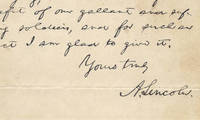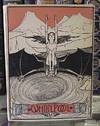
President Abraham Lincoln Expresses His Personal Concern for ""our gallant and suffering soldiers"": He does this the very day he appoints Ulysses S. Grant to command all Union troops in March 1864
- Used
- Hardcover
- Signed
- Condition
- See description
- Seller
-
Ardmore, Pennsylvania, United States
Payment Methods Accepted
About This Item
Lincoln donated this famous letter and its message to a Sanitary Fair, while praising the women for the work ""you are so patriotically employing"" to raise funds for his sick and wounded troops
An extremely rare written mention of his all-known empathy and concern for the suffering and gallant soldiers of the Union
The “Collected Works of Abraham Lincoln” show that Lincoln specifically mentioned “suffering soldiers” just four times during his presidency; this is one of those four mentions
Lincoln’s compassion and mercy are central to his legacy, and the picture that has come down to us envisions him as a man who was generous of spirit. From the start of the Civil War, Lincoln felt the weight of the sacrifice that so many families were making for the Union, and he saw that tens and then hundreds of thousands of men – sons, husbands, and brothers – were dying. He was not anxious for any additional lives to be taken. He
The United States Sanitary Commission cared for the Union's sick and wounded soldiers and promoted clean and healthy conditions and army camps. It held fairs in certain large cities around the country, mainly in 1863-4, to raise funds for its activities. These large-scale fairs were mainly run by women who wanted to do their part, and were social events that combined entertainment, education, and philanthropy. Lincoln was intensely interested in this branch of civilian service, and his personal assistance to benefit these fairs is well known, as he contributed documents and signatures, and on rarer occasions letters, to be sold or auctioned at the fairs.
In Brooklyn, civic-minded women’s organizations orchestrated the hugely successful Brooklyn Sanitary Fair for February 1864. The Fair was held in the Brooklyn Academy of Music building on Montague St., as well as in two buildings to be built just for the Fair. Dances, parades, a daily newspaper, museums, merchandise sales, and auctions and even a cattle show were part of the Fair. The Woman's Relief Association Depot prepared and packaged goods for the soldiers and for hospital use. The Hall of Manufacturers featured new and old wares presented by the leading manufacturers and businessmen of Brooklyn and Long Island. February 22, 1864 was the glorious opening of the Brooklyn Sanitary Fair, which was to last for two weeks. By March 8, 1864, the closing day of the Fair, it was announced that the Fair had raised $400,000, which was more money than any other previous fair to that date. The money was used for clothing, food, medical supplies, and other provisions for the Union soldiers.
At the Brooklyn Sanitary Fair in 1864, one of the attractions was the ""New England Kitchen."" Women dressed in colonial costumes and demonstrated the kinds of activities done by women at the time of the American Revolution in 1776. The New England Kitchen determined to approach President Lincoln about providing a memento that it could sell as part of its activities. The daily newspaper published during the Fair, in the issue of March 5, 1864, printed the following notice: “It appears that the President of the United States has kindly shown an active interest in our Fair. Rev. Mr. Woodruff, of the Hanson Place M.E. Church in this city, during an interview with President Lincoln on Wednesday, obtained an autograph letter to the New England Kitchen, which was handsomely announced yesterday at the dinner- table of the Kitchen, by Mr. Murray, and instantly sold for one hundred dollars to C. H. Mallory, Esq., of Mystic Bridge Connecticut."" This was fully one-quarter of the Fair’s entire proceeds.
This is that very letter, dated the same day US Grant was commissioned a Lt General. Grant assumed command of all Union Armies in the field the following day. Autograph letter signed, on Executive Mansion letterhead, Washington, March 2, 1864, “To the New-England Kitchen, connected with the Brooklyn Sanitary Fair”. ""It is represented to me that my autograph, appended to this little note, may somewhat augment, through the means you are so patriotically employing, the contributions for the benefit of our gallant and suffering soldiers, and for such an object I am glad to give it. Yours, truly, A. Lincoln."" As the “Abraham Lincoln Quarterly” wrote, by their very preservation after 150 years, these mementos “indicate the importance of the Sanitary Fairs in the life of the Union, and Lincoln's devotion to the amelioration of personal suffering.” It also shows that Lincoln singled out for praise those patriotic people (mainly women) who were putting on the fairs to aid the soldiers.
Lincoln’s deep interest in the “suffering soldiers” may also be seen in the Gettysburg Address, and his correspondence following in its wake. In Gettysburg, he stressed, “The brave men, living and dead, who struggled here, have consecrated it far above our poor power to add or detract. The world will little note, nor long remember, what we say here, but can never forget what they did here.” It is well known that the great orator Edward Everett, who preceded Lincoln on the platform at Gettysburg, wrote Lincoln, “I should be glad if I could flatter myself that I came as near the central idea of the occasion in two hours as you did in two minutes.” Lincoln responded to Everett saying his speech was also praise-worthy in focusing on those who aid “suffering soldiers.” “Your kind note of to-day is received…I am pleased to know that in your judgment the little I did say was not a failure…The tribute to our noble women for their angel ministering to the suffering soldiers surpasses in its way, as do the subjects of it, whatever has gone before.”
The “Collected Works of Abraham Lincoln” show that Lincoln specifically mentioned “suffering soldiers” just four times during his presidency. This is one of those four mentions.
Reviews
(Log in or Create an Account first!)
Details
- Bookseller
- The Raab Collection
(US)
- Bookseller's Inventory #
- 22196
- Title
- President Abraham Lincoln Expresses His Personal Concern for ""our gallant and suffering soldiers""
- Book Condition
- Used
- Binding
- Hardcover
- Date Published
- 02/03/1864
Terms of Sale
The Raab Collection
10 day return guarantee, with full refund excluding shipping costs for up to 10 days after delivery if an item is returned in original condition
About the Seller
The Raab Collection
About The Raab Collection
Glossary
Some terminology that may be used in this description includes:
- New
- A new book is a book previously not circulated to a buyer. Although a new book is typically free of any faults or defects, "new"...
- Fair
- is a worn book that has complete text pages (including those with maps or plates) but may lack endpapers, half-title, etc....
- Poor
- A book with significant wear and faults. A poor condition book is still a reading copy with the full text still readable. Any...

